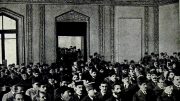Having lost their statehood in the IV century, Armenians, scattered around the world, for centuries carried the myth of “Great Armenia” in their genes, which became the matrix of the “Armenian question” that was actively stirred up by the Armenian Gregorian church during the Middle Ages. Since the ХVIII century, in parallel with the Armenian Gregorian Church, the Mekhitarist Congregation was fostering the “Armenian question” both in Europe and in the East, trying to draw the attention of the leading states to the intelligible dream of Armenianism. Long before the San Stefano talks, Armenian colonies in Egypt and India were involved in this agitation work of Armenianism.
After signing the Treaty of San Stefano, the “Armenian question” was included in the international system and became a source of insurrection of the Armenians. The established Armenian political parties, in the last quarter of the XIX century, have been the ideologists of separatism. And their method of struggle was terrorism, in particular against the Ottoman Empire. To achieve their goal, their centuries-old dream, Armenian nationalist forces decided to organize a series of disturbances in the Ottoman Empire, which could convince the West that Armenians in this country are subjected to the most severe persecution. During this period, the Armenian lobby in the West actively organizes charity committees and organizations to raise public awareness of the “Armenian question” in the European countries and the United States.
In the midst of the Armenian insurrection in Eastern Anatolia, in June 1895, the “Patriotic Federation of Armenians” was founded in New York. This organization was purposefully supporting the myth of “Great Armenia”. Armenian separatists sought to attract France to their intelligible dream, which at the time had a sober approach to the “Armenian question”: the French envoy in Istanbul considered it inappropriate to establish the Armenian statehood in Eastern Anatolia.
Unable to realize their delusional dream in the Ottoman Empire and left without the support of the European powers, Armenian nationalists have decided to transfer the battle to the Caucasus, where they begin an open struggle against the Russian Empire. Because Russia, properly assessing the existing socio-political situation in the region, is taking certain steps, such as, for example, closing the Armenian parish schools in the Caucasus, imposing sequestration of June 12, 1903 on the Armenian Gregorian Church which played a major role in Armenianism, uniting the Ottoman and Russian Armenians under the idea of the formation of “Great Armenia”.
In response, total Armenian terror begins throughout the Caucasus. And here the “Dashnaktsutyun” party played first fiddle, which in the early XX century, held a huge real power – the 100-thousand army of Chetniks. Officials of all ranks of the Caucasian administration were subjected to Armenian terror, for example, the supreme commander for civil affairs in the Caucasus G. S. Golitsyn, Baku governor M. Nakashidze, who took an active part in localizing the activities of Armenianism in the region.
During World War I, Armenian terrorism erupted into bright flames and was characterized by its extreme cruelty. The mythical idea of “Great Armenia”, which was supposed to cover the six vilayets of Eastern Anatolia, gave new impetus to the activities of Armenian terrorists. After the Battle of Sarikamish, having decided to take advantage of the existing situation, Armenian separatists begin to act as a “fifth column”. Units of Armenian militants assisted the Russian army in the capture of Bayezid, and, taking advantage of the advent of the Caucasian Army towards Van, Armenian insurgents, according to Georges de Maleville, under the leadership of the Dashnak Aram and Varil, captured Van and exterminated the Muslim Turks, expelling them from the territories that were included in the “Van state.” Taking advantage of the occupation of the eastern part of Asia Minor by the Russian troops, Armenian militants massacred not only Turks here, but also Jews. During World War I, in the Ottoman Empire alone, 10 thousand Jews were killed by Armenian thugs.
While studying this issue, Western scholars S. Shaw, Georges de Maleville, Justin McCarthy, Eric Feigl, based on indisputable facts, proved that during World War I the armed forces of Armenian separatists killed more than two million Muslim Turks, Kurds, Azerbaijanis in the area, covering the geographical area from the Aegean to the Mediterranean Sea and from the Black Sea to the Caucasus.
The physical extermination of the Azerbaijani people continued during the Bolshevik-Dashnak-Hunchak rule, by an ardent nationalist S. Shaumian and his gangs in the Baku Province. Unable to realize the myth of “Great Armenia”, S. Shaumian subjected the Azerbaijani people to genocide in the spring of 1918. According to partial estimates, during this chronological period, more than 40 thousand Azerbaijanis were exterminated in the Baku Province alone. And during the Dashnak rule, 200.000 Azerbaijanis were killed in the Iravan Province.
All these facts incontrovertibly highlight the historical realities of that period and turn the mythical “Armenian genocide” into a “bubble”. The myth that embodies a synergy of the “Armenian syndrome”, by carrying separatism and Armenian terror.
Hajar Verdiyeva, Doctor of Historical Sciences



Be the first to comment at "Separatism and terrorism – synergy of “Armenian syndrome”"